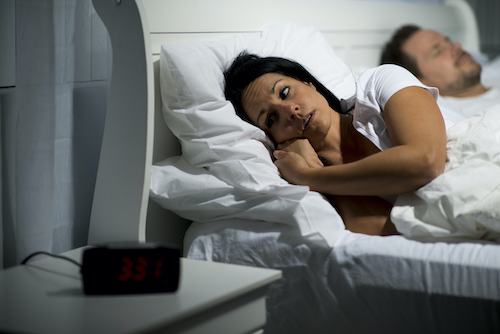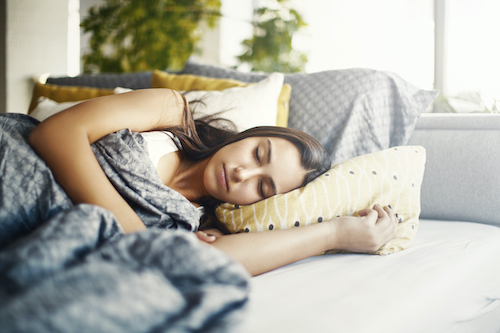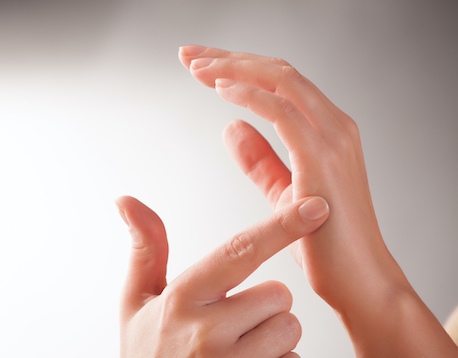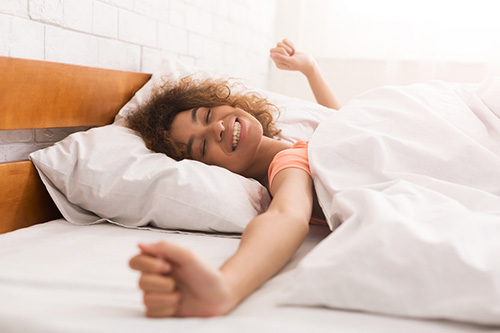By Dr. Sharon Stills, NMD
We all know by now how important sleep is in our day-to-day lives. It’s essential to staying mentally sharp and energetic during the day, and getting good, regular, restful sleep also reduces the risk of many serious health issues, from weight gain to diabetes. Sleep even slows biological aging!

But what may be a surprise is just how closely intertwined women’s sleep patterns are with their hormones — one reason why sleep disturbances are so common during and after menopause.
How hormones help with sleep
Many people have heard about melatonin, the “sleep hormone” produced in the pituitary gland in the brain that is crucial to helping us fall asleep. But sleep is a lot more complicated a process than the “add melatonin and stir” perspective allows for. The truth is, falling asleep is just the beginning, and it takes multiple hormones — including estrogen, progesterone, and cortisol — participating in the sleep cycle to keep us asleep.
These hormones do this by helping to bring us in and out of the different sleep stages and promoting wakefulness when morning comes.
Progesterone has a fairly straightforward effect — it’s essentially a sedative. It naturally stimulates receptors in the brain in a manner that’s very similar to the the anti-anxiety medications called benzodiazepines. But it also stimulates breathing and has been used to reduce sleep apnea — short interruptions of breathing that cause the body to awaken from sleep. Sleep apnea is a common contributor to poor sleep in women during and after menopause, and it’s partly due to imbalanced progesterone levels.
Estrogen has a more complicated role — or maybe I should say “roles” — to play. First, it supports slow-wave sleep (SWS), which is what most people call “deep” sleep, and it prolongs rapid-eye-movement (REM) sleep, the stage of sleep in which we dream. REM sleep tends to come right after SWS, and it’s an important transition in our sleep cycle because if you waken after SWS without having gone through REM, you’ll feel groggy and sluggish. In effect, estrogen, by smoothing the way from deep sleep into dreaming, reduces the neurological sludge that slows down the brain in the morning.
But that’s not all it does. It’s a key metabolizer of several important neurotransmitters: serotonin, acetylcholine, and norepinephrine, all of which are involved in different stages of sleep. Acetylcholine is highly active in REM sleep (whereas serotonin and norepinephrine are all but absent) and both serotonin and norepinephrine play key roles in non-REM sleep and circadian rhythms. Estrogen is therefore essential to maintaining the levels of key brain chemicals that regulate different phases of the sleep cycle.
And it does something else: It acts as a booster to two hormones that are vital to both falling asleep and waking up: melatonin and cortisol. In the case of melatonin, it seems to exert a supportive effect that wanes as estrogen levels drop (the relationship isn’t clear, but the fact that women with reduced estrogen have lower melatonin is well-established). It also regulates the normal rise in cortisol that signals the body that it’s time to wake up.
Estrogen has another role that’s not directly implicated in the sleep cycle, but that contributes to restless nights: it’s involved in temperature regulation. If that makes you think “Oh, you mean… hot flashes!” you’re 100% right. As estrogen declines, women experience sudden shifts in body temperature that have nothing to do with how hot or cold the room they’re in might be — and some of these can be intense enough to wake you up out of even a sound sleep (which, if our hormones are shifting, we may not be having anyway).
When you understand how the key sex hormones are also key sleep hormones, it starts to make sense that menopause — the time when women’s bodies start to gradually reduce production of those two hormones — is often accompanied by insomnia and frequent waking.
It matters how fast menopause happens
So what happens when the production of estrogen and progesterone don’t so much “taper off” as “crash” — like when you go through menopause surgically? As you might expect, it means a hard landing — not only do women who have surgical menopause have less satisfying sleep quality, it’s also shorter in duration. In one study, women who underwent surgical menopause were more than twice as likely to have insomnia as women who went through natural menopause. Another study that used data from over 100,000 participants in the Nurses’ Health Studies (I and II) noted that women undergoing surgical menopause are much more likely to develop obstructive sleep apnea.
In general, even if you don’t go through menopause via surgery, having a more rapid transition with greater levels of symptoms like hot flashes and mood changes predicts more frequent sleep disturbances.
It’s no accident that menopause, sleep deprivation, and depression go hand-in-hand — or that all three are much more difficult for women who undergo surgical menopause. Whether the drop in hormones leads to sleep loss, which leads to mood swings, or the hormonal drop leads to mood swings and that, in turn, impacts sleep is an eternal question — but nobody argues that they’re not intertwined. And it makes sense, doesn’t it, given the intertwining of hormones and neurotransmitters that are involved in mood, hot flashes, and sleep.
Why your doctor’s sleeping pill prescription is all wrong
If you’ve shared your sleep issues with your conventional doctor only to walk out of the office with a prescription for a sleep drug like Ambien, I want you to know that taking a prescription sleep drug — at best — is only a band aid. At worst, sleep drugs can be habit forming and carry dangerous short and long term side effects, such as memory issues, depression, sleep walking, sleep hallucinations, and next day grogginess.
The key to getting better sleep in menopause is to listen to your body — and your hormones. As menopause unfolds, you want to really take care that you are doing everything you can to keep your hormones — estrogen, progesterone, cortisol — in balance.
You can take so many steps right now to support your hormones and your sleep:
Don’t wait. If you’re just starting your transition into menopause (or you know that surgical menopause is in your future), don’t wait — take steps now to determine where you might need some support for your hormone balance. You can start by taking our free Menopause Quiz to learn more about hormonal imbalances you may have and how to take steps to correct them.
For most women, natural herbal remedies are an effective way to rebalance hormones. Some women with mild imbalances of progesterone also do well using a bioidentical progesterone. Typically for sleep, oral micronized bioidentical progesterone is preferred for sleep issues because it crosses the blood-brain barrier.
For women recovering from surgical menopause, biodentical hormones can ease your transition. You will want to work with a doctor who is skilled in prescribing biodenticals to get the best match. Please note: biodentical hormones and synthetic hormone replacement therapy are two completely different things. As I tell my own patients, synthetic HRT is toxic to women’s health.
It also helps to support your liver in its job of metabolizing hormones. One easy method: begin each day with a warm glass of lemon water, which offers hydration and a vitamin C boost. And it probably goes without saying that making sure you are eating a wholesome diet, drinking enough water, avoiding caffeine in the afternoon and evening, and generally practicing good sleep hygiene are good ideas.
Guard against hot flashes. Knowing estrogen’s role in temperature regulation, you can take steps to head off hot flashes before they start by avoiding foods that are known triggers, such as spicy foods or wine — and stay away from tobacco and alcohol in general, but especially right before bed. Also, wear loose and breathable PJs; cotton knits (think t-shirt cloth) are usually a good choice, but avoid synthetic blends or heavy, woven fabrics like flannel that hold in heat. If you have a separate thermostat in your bedroom, set it a little cooler and make sure the room is well-ventilated. The National Sleep Foundation suggests keeping a small bucket or bowl of ice and a washcloth next to your bed for a quick cool-down if hot flashes wake you.
Pay attention to your stress levels. I’ve been focusing on sex hormones here, but lurking on the sidelines is cortisol, the key stress hormone in our fight-or-flight response. Cortisol’s circadian rhythm is regulated in part by estrogen, so it makes sense that when there’s less estrogen, there may be some disturbances in how cortisol rises and falls during the day — which can add to sleeplessness, especially if (as many of us are) you’re already producing excess cortisol due to stress. Finding ways to manage stress in menopause is another key to good sleep!
One helpful stress-relief method is gentle exercise — yoga, tai chi, or even just a routine of stretching — an hour or more before bed. Personally, I find the yoga pose “legs up the wall” can be helpful. Try holding the pose for 10-15 minutes. You don’t want to do hard exercise as that will boost cortisol just when you’re trying to quiet it, and you don’t want to do even light exercise too close to bedtime that you can’t cool down.
Listen to your body and give it the self care it needs to feel soothed and rested at the end of the day. I have some other sleep secrets that I want to share with you, so check them out!
A good night’s sleep can make all the difference, and is completely within your reach.
References
Baker FC, de Zambotti M, Colrain IM, Bei B. Sleep problems during the menopausal transition: prevalence, impact, and management challenges. Nat Sci Sleep. 2018; 10: 73–95.
Cho NY, Kim S, Nowakowski S, Shin C, Suh S. Sleep disturbance in women who undergo surgical menopause compared with women who experience natural menopause. Menopause. 2019 Apr;26(4):357-364. doi: 10.1097/GME.000000000000125
Eichling PS; Sahni J. Menopause related sleep disorders. J Clin Sleep Med 2005;1(3):291-300.
Guida M, Rega A, Vivone I, et al. Variations in sleep associated with different types of hormonal contraceptives. Gynecol Endocrinol. 2019 Jul 17:1-5. doi: 10.1080/09513590.2019.1640204. [Epub ahead of print]
Huang T, Lin BM, Redline S, Curhan GC, Hu FB, Tworoger SS. Type of Menopause, Age at Menopause, and Risk of Developing Obstructive Sleep Apnea in Postmenopausal Women. Am J Epidemiol. 2018 Jul 1;187(7):1370-1379. doi: 10.1093/aje/kwy011
McGinty DT. Serotonin and Sleep: Molecular, Functional, and Clinical Aspects [book review].
Sleep. 2009 May 1; 32(5): 699–700.









